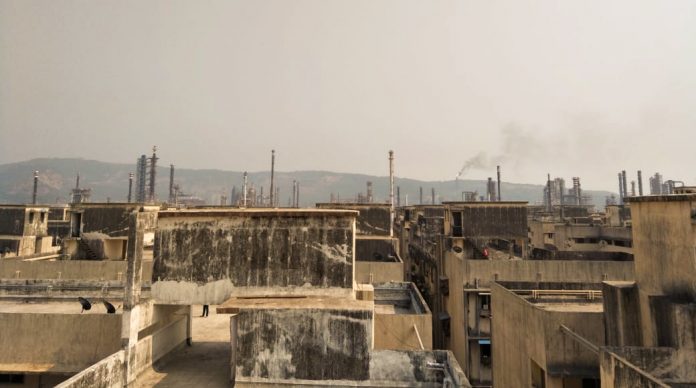Setting a strict example, the National Green Tribunal imposed hefty fines to the tune of Rs 286 crore on four firms responsible for creating “gas chamber like condition” in Mahul, Ambapada and Chembur areas of Mumbai.
By Shaheen Parween
The National Green Tribunal recently imposed a fine of Rs 286 crore on four firms responsible for creating “gas chamber like condition” in Mahul, Ambapada and Chembur areas of Mumbai. The Tribunal imposed a fine of Rs 20 lakh on Sea Lord Containers Ltd (SLCL), Rs 142 crore on Aegis Logistics Ltd (ALL), Rs 67.5 crore on Bharat Petroleum Corporation Ltd (BPCL) and Rs 76.5 crore on Hindustan Petroleum Corporation Ltd (HPCL).
The bench comprised of Chairperson Justice Adarsh Kumar Goel, Justice SP Wangdi and Dr Satyawan Garbyal (Executive Member). They were hearing an application filed by Charudatt Koli for execution of an earlier order of the Tribunal, dated December 18, 2015, wherein it considered the issue of remedial steps to be taken for control of air pollution in the above three areas in Mumbai.
Logistic services, storing oil, gas and chemical items, as well as oil companies releasing emissions of volatile organic compounds (VOCs) during loading, storage and unloading or handling of hazardous chemicals at various stages were said to be major contributors to the air pollution. The Tribunal found that there was deterioration of surrounding air quality, causing a threat to the health of residents in these areas.
Accordingly, the Tribunal directed the Maharashtra Pollution Control Board to prepare a comprehensive action plan for control of air pollution. A Health Impact Assessment study was directed to be carried out, apart from the VOC assessment study. The Tribunal issued other incidental directions for prevention and remedial action by the operators of various projects as well as regulatory authorities.
The Tribunal thereafter sought a “respiratory morbidity survey” report from KEM Hospital in Mumbai for residents in Ambapada, Chembur and Mahul. According to the survey report, 67.1 percent of the people in Mahul area complained of breathlessness more than three times a month, 76.3 percent reported complaints in all seasons, 86.6 percent complained of eye irritation and 84.5 percent felt persistent chest pain. Further, a pulmonary function test revealed that 7.3 percent had mild restriction and 5 percent had mild obstruction of the lungs.
Thereafter, the applicant filed an execution application before the Tribunal alleging non-compliance with the direction dated December 18, 2015. The Tribunal, after perusing the report of the Joint Committee, dated January 1, 2019, found damage to the air quality by VOC emissions and suggested steps for their control. The Tribunal then directed remedial action and assessment of compensation on polluter pays principle.
While imposing the above costs, the Tribunal observed: “While it is true that there may be many reasons for the presence of VOCs in the atmosphere, like vehicular emissions etc, it cannot be denied that the said four companies e.g. ALL, SLCL, BPCL and HPCL contribute substantially and predominantly to the VOCs in Mahul and Ambapada villages.” It added: “The prolonged exposure to hazardous air pollutants even at minuscule level may weaken the lungs and other organs. Conditions prevailing in the area are sometimes likened to that of Gas chamber.” The Tribunal accepted the computation made by the Central Pollution Control Board (CPCB) which had constituted an in-house technical committee to determine the damage caused to the environment. The fine imposes absolute liability on parties handling harmful substances to pay for any damage caused.
The Tribunal further observed that the respondent companies had been taking action to prevent the harmful emissions which were particularly noticeable after 2015 and at present, the industries have acted on implementation of the action plan. Accepting the report submitted by CPCB, the Tribunal observed: “The CPCB has accordingly assessed the values of VOCs emissions based upon the data provided to them by the companies. In view of the submissions made by the CPCB and above discussion, the objections of the units regarding use of data prior to control measures and the incorrect application of the formula and methodology are untenable. We are satisfied that all the objections raised by the respondent companies have been duly considered by the CPCB’s in-house Technical Committee and we are satisfied with the correctness of the conclusion arrived at by the CPCB. No further hearing is necessary in view of clarifications made by the CPCB.”

The Tribunal further said that a ten-member joint committee comprising two senior nominees of CPCB, representatives of Ministry of Environment, Forest and Climate Change; State Pollution Control Board; District Magistrate, Mumbai; National Environmental Engineering Research Institute; Tata Institute of Social Sciences, Mumbai; IIT Mumbai; KEM Hospital, Mumbai and a nominee of health secretary, Maharashtra, may prepare an action plan for restoration measures spread over a span of time not beyond five years.
It said that the State Pollution Control Board will be the nodal agency. The plan in particular will provide for dealing with health issues of the inhabitants and measures for control of pollution in the three areas which will be a Special Air Pollution Control Area for the restoration plan, the Tribunal said.
The finalisation and execution of the action plan will be overseen by Justice VM Kanade, former judge of Bombay High Court, with the assistance of technical experts nominated by CPCB and State Pollution Control Board. Justice Kanade will be free to take any other independent assistance, it said.
Lead Picture: cps.iitb.ac.in


